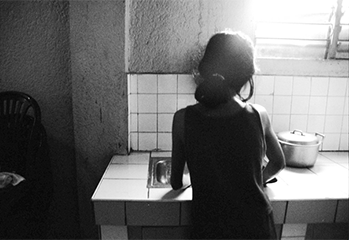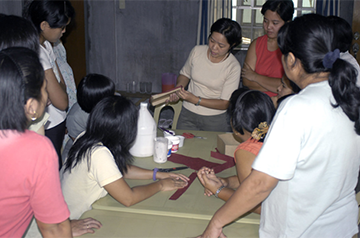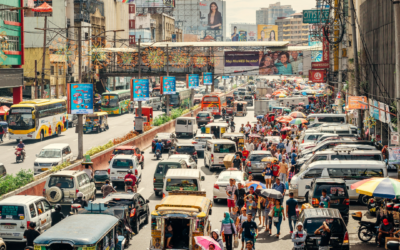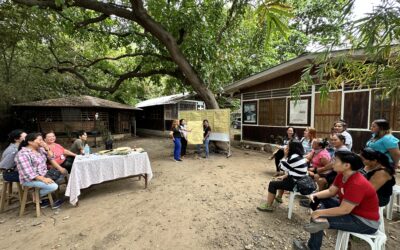Philippines
Slavery in Philippines
 The Global Slavery Index estimates that there are approximately 784,000 victims of modern slavery in Philippines.
The Global Slavery Index estimates that there are approximately 784,000 victims of modern slavery in Philippines.
The Philippines faces significant challenges as a source country and, to a lesser extent, a destination and transit country for men, women, and children subjected to trafficking. According to the International Labor Organization, 1 million Filipino men and women leave the country every year to work overseas, and a total of 10 million Filipinos live and work abroad. A significant number of these overseas workers have been found to have been trafficked and subjected to servitude, debt bondage and forced labor in Asia and in the Middle East.
Poor socioeconomic conditions in various parts of the country render large sectors of the population highly vulnerable both to transnational and internal trafficking. Within the country, people are trafficked mostly from rural areas to urban centers. Children and adults are exploited through debt bondage and forced labor in agriculture, including in tobacco fields, sugar cane and banana plantations, small-scale manufacturing, and in the fishing industry. Children work in farms and plantations, in dangerous mines, on streets, in factories, and in private homes as child domestic workers.
The high vulnerability of large sectors of the population, coupled with the promise of better work abroad, has led allowed illegal recruiters to traffic a significant number of Filipinos. Increasing access to the internet has exposed children to be exploit online.
Our Solutions in Philippines
Training and Capacity Building
We provide opportunities for grassroots organizations to have access to innovative training to counter trafficking in the communities they serve. We provide training sessions and forums that allow organizations to learn from industry experts and various organizations’ effective strategies.
 Livelihood and Cooperative Formation
Livelihood and Cooperative Formation
We share similar aspirations with local governments in the Philippines that the next step in providing a renewed life for survivors is to enable them to earn and live a decent life. We are partnering with local organizations and various government agencies to provide skills training to survivors and create cooperatives that create a shared value to sustain their livelihood endeavors together.
Coalition Building
We work with organizations to identify and network groups Mindanao. We provide opportunities for organizations to exchange best practices and strengthen their capacity to safeguard their own communities and sustain their efforts through joint fundraising and implementation of projects.
Our Partners in Philippines
Free the Slaves collaborates with…
- JPI – IDC: JPIC-IDC is committed to work for strengthening of families, protection, and care ofwomen and children, integral empowerment of communities towards sustainable development, disaster preparedness, and emergency response and rehabilitation.
- Balaod Mindanaw: Balaod Mindanaw believes in the legal empowerment of marginalized groups and communities as a way of advancing their access to justice, gender equality, and legal improvement in the ownership and use of natural resources (resource tenure) within the context of people actively participating in governance. To achieve this, the organization constantly engages with various marginalized groups through paralegal formation and capacity-building, alternative lawyering, policy formulation, and through advocacy that is guided by active and non-violent participation as a vital standard.
- Balay Mindanaw: Balay Mindanaw pursues a vision of equity, development and peace for Mindanao through peace-building and sustainable integrated area development approach by promoting democratic participation in local governance and agrarian reform. Implementation entails work in community organizing, networking, partnership building, education, research, publication and advocacy.
- Voice of the Free: Voice of the Free (VF) is an officially accredited Philippine non-government organization known for innovations in addressing modern slavery, especially human trafficking and domestic servitude. VF has partnered with more than 400 local and international socio-civic groups, NGOs, government agencies, and private institutions.
The Latest From Philippines
Modern Slavery in the Philippines: A Closer Look
Despite significant progress in anti-trafficking efforts, modern slavery continues to impact an estimated 859,000 people in the Philippines. Vulnerable groups, including migrants, children, and women, face exploitation in forced labor, sex trafficking, online abuse, and hazardous industries. While the Philippines has retained Tier 1 status in the 2024 Trafficking in Persons Report, systemic challenges like corruption and insufficient victim screening hinder further advancements. This blog explores the forms of modern slavery affecting the country and outlines actionable steps to strengthen protections and support survivors.
Empowering Students to Combat Modern Slavery with Xavier University
Free the Slaves partnered with Xavier University – Ateneo de Cagayan’s National Service Training Program to educate over 110 students on modern slavery. Through workshops, students explored actionable solutions, such as leveraging social media and participating in local discussions, to fight human trafficking. This initiative highlights the pivotal role of youth in creating a world free from exploitation.
Strengthening Survivor Voices: Training with Survivor Groups in the Philippines
This initiative represents more than just empowerment; it is about creating leaders who can drive meaningful change in their communities and inspire others to join the fight against human trafficking. By focusing on survivor leadership, we are building a movement that is rooted in the experiences and voices of those who have lived through the horrors of trafficking, ensuring that their insights guide our collective efforts to end modern slavery.



